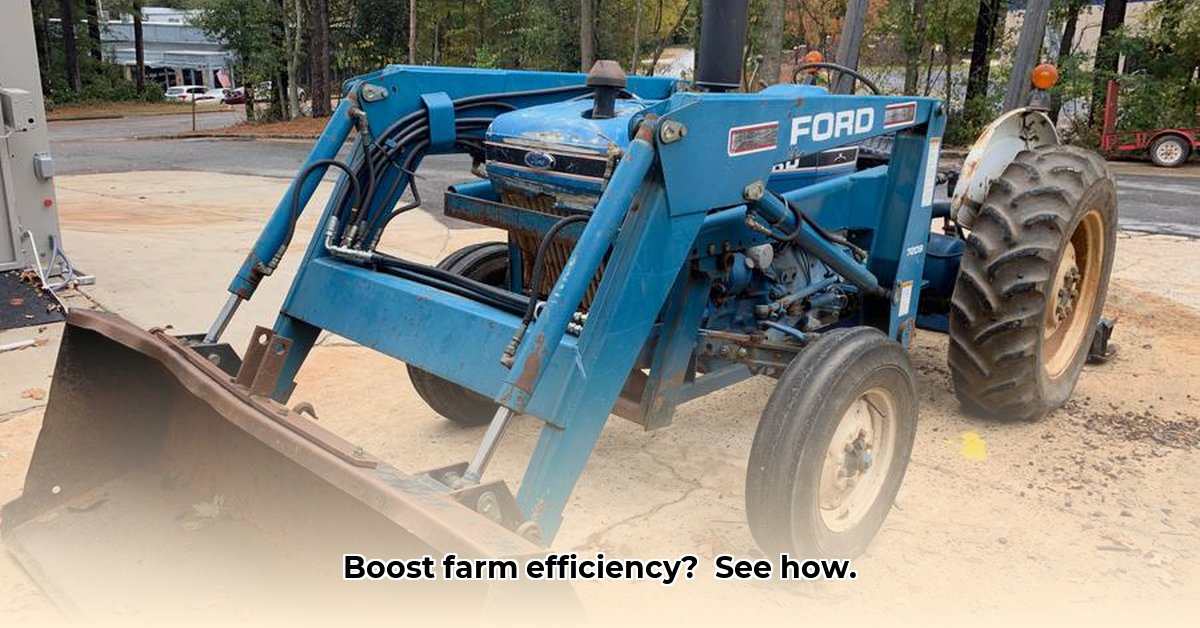
Why Choose a Used Ford Tractor Loader?
Used Ford tractor loaders offer a compelling blend of affordability and reliability, making them an attractive option for sustainable agriculture. New equipment carries a hefty price tag, potentially straining your budget. A well-maintained used Ford loader, however, significantly reduces upfront costs, freeing up capital for other essential farm investments. But are there any downsides? Let's delve into the pros and cons. For more information on specific Ford tractor models, check out this useful resource.
Pros and Cons of Used Ford Tractor Loaders
| Feature | Pros | Cons |
|---|---|---|
| Cost | Significantly lower initial investment than new equipment. | Potential for unforeseen repairs; older models may require more maintenance. |
| Reliability | Ford tractors have a strong reputation for durability and longevity. | Sourcing parts for older models can be more challenging than for newer ones. |
| Sustainability | Extending equipment lifespan promotes environmental responsibility. | Older models may have lower fuel efficiency compared to newer designs. |
| Adaptability | Many Ford tractor loaders are compatible with various attachments for diverse tasks. | May lack compatibility with the latest precision farming technologies. |
Finding and Maintaining Your Ford Tractor Loader: A Step-by-Step Guide
Ready to acquire your perfect used Ford tractor loader? Follow these steps for a successful purchase and long-term operation:
Thorough Inspection: Meticulously examine the loader, paying close attention to hydraulics, lifting arms, and all moving parts. Look for leaks, rust, or any signs of damage. While minor wear is expected, major issues are a clear warning sign.
Parts Availability Check: Before committing to a purchase, research the availability of replacement parts for that specific model. Ensuring easy access to parts prevents costly downtime.
Professional Assessment: A pre-purchase inspection by a qualified mechanic is highly recommended. This preventative measure can safeguard against expensive surprises later on. The cost is a worthwhile investment.
Fuel Efficiency Inquiry: Compare the fuel consumption of older Ford models to newer ones. Newer models often boast improved fuel efficiency, a significant factor in operating costs.
Compatibility Confirmation: Ensure the loader is compatible with your existing implements and any future precision farming technology you plan to integrate.
Keeping Your Investment Healthy: Sustainable Maintenance
Regular maintenance is crucial for maximizing the lifespan of your Ford tractor loader.
Regular Servicing: Schedule routine oil changes, filter replacements, and lubrication – preventative maintenance prevents costly breakdowns.
Address Minor Problems Promptly: Don't ignore small issues; they can escalate into major problems. Addressing a small leak early can prevent catastrophic engine failure.
Develop Relationships with Reliable Parts Suppliers: Establishing a strong relationship with a trustworthy parts supplier ensures timely access to necessary components.
The Big Picture: Sustainable Farming for the Long Haul
Investing in a used Ford tractor loader is a long-term commitment to sustainable farming. By prioritizing maintenance, parts availability, and potential future upgrades, you can ensure its longevity. This approach aligns with environmentally responsible practices – it benefits both your farm's bottom line and the planet. By making informed choices, you contribute to a more sustainable agricultural future, while simultaneously saving money.
How to Improve Fuel Efficiency of Older Ford Tractors for Sustainable Farming
Key Takeaways:
- Acquiring used Ford tractors offers significant cost savings.
- Repurposing existing equipment reduces environmental waste.
- Fuel efficiency improvements are possible through specific maintenance and adjustments.
- Older models may present challenges in incorporating advanced precision farming technologies.
- Skilled maintenance is crucial for maximizing the lifespan and fuel efficiency of the tractor.
Optimizing Your Older Ford Tractor: Practical Steps
Improving the fuel efficiency of an older Ford tractor is achievable through several key steps:
Regular Maintenance: Consistent oil changes, filter replacements, and lubrication are critical for optimal engine performance and fuel efficiency. This is equivalent to preventative healthcare for your machinery.
Engine Tune-Up: A professional tune-up ensures the proper air-fuel mixture, optimizing combustion and fuel efficiency. Think of it as recalibrating your equipment for peak performance.
Tire Pressure: Maintain correct tire inflation; under-inflated tires increase rolling resistance and fuel consumption. Proper inflation is a simple yet impactful improvement.
Efficient Driving Techniques: Smooth operation, avoiding harsh acceleration and braking, minimizes engine strain and improves fuel economy. Think of it as driving smoothly to save gas.
Reduce Unnecessary Weight: Remove any extra implements, tools or ballast that adds unnecessary weight, reducing the load on the engine and improving fuel consumption. Extra weight is fuel inefficient weight.
Consider Sustainable Fuels: Explore using biodiesel or other suitable alternatives, but only if compatible with your tractor and compliant with regulations. This is an environmentally conscious choice that can save costs. Before switching, consult your Ford tractor's manual.
Implement Precision Farming Techniques: Optimize your field operations based on soil conditions and crop needs. Even without sophisticated technology, precision farming results in fuel efficiency improvements by reducing unnecessary passes.
Addressing Potential Challenges
While improving the fuel efficiency of older Ford tractors is achievable, several challenges must be considered.
Parts Availability: Finding parts for older models can require extra effort. Strong relationships with parts suppliers are invaluable.
Technological Limitations: Integrating newer technologies can be difficult due to compatibility issues. Carefully research compatibility before investing in upgrades.
Specialized Skills: Maintenance and upgrades require mechanical expertise. Investing in training or using experienced mechanics is recommended. A skilled mechanic is key to the success of this project.